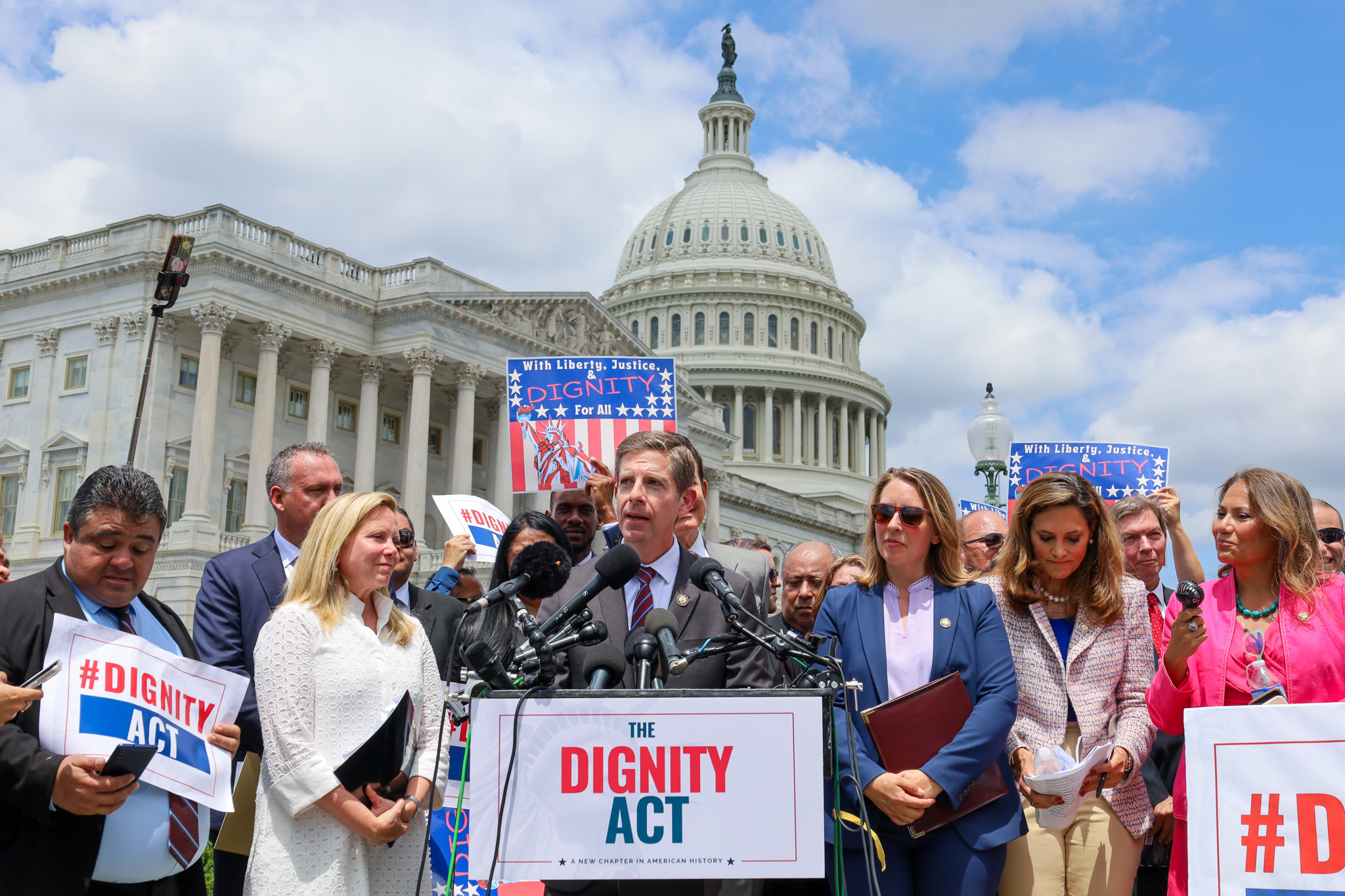Rep. Mike Levin Joins Bipartisan Coalition to Reintroduce Comprehensive Immigration Reform Bill: The Dignity Act

Washington, D.C.—Today, Rep. Mike Levin (CA-49) joined Reps. Veronica Escobar (TX-16) and Maria Elvira Salazar (FL-27), along with 17 of their colleagues, to reintroduce a historic, bipartisan immigration bill: the Dignity Act of 2025. After more than two years of negotiation, this bill is an updated compromise agreement that addresses legal status and protections for undocumented immigrants, border security, asylum reform, and visa reform.
Watch Rep. Levin’s remarks here.
The Dignity Act makes meaningful reforms to several aspects of our immigration system:
- It grants legal status and protections to undocumented immigrants already living in the United States;
- It reforms the asylum screening process to provide opportunity for review and access to council;
- It creates new regional processing centers, so migrants do not have to make the perilous journey to the U.S.-Mexico border to seek asylum;
- It invests in border security and modernizes our land ports of entry;
- It mandates accountability for Immigration and Customs Enforcement (ICE);
- It provides protections for Dreamers, Temporary Protected Status (TPS) holders, and Deferred Enforced Departure (DED) holders.
“It’s long past time for Congress to do its job when it comes to immigration reform. Mass deportations are not the answer. Neither is punishing working families or tearing apart communities. We can invest in border security and still uphold our values. We can enforce our laws and still protect families. These ideas aren’t mutually exclusive — they’re fundamentally American,” said Rep. Levin “For those who are contributing positively to our society and economy, we need a better process and a realistic path for them to stay in this country. These are our neighbors and our friends. Let’s honor that promise — by protecting Dreamers, improving pathways to legal status, securing the border, and passing the Dignity Act.”
The last time Congress passed immigration reform was in 1996, which was driven by Republicans and signed into law by President Bill Clinton. That bill eliminated several legal immigration pathways, essentially making fewer people eligible for legal status while making more people deportable.
As we are witnessing historic executive overreach and redirection of resources to our border, it is clear Congress needs to update our immigration laws. And it is not like Congress has not had the opportunity; over the last 10 years, eight major pushes for immigration reform have failed:
- In 2013, the Senate on a bipartisan basis passed the Border Security, Economic Opportunity, and Immigration Modernization Act of 2013, but House Republicans refused to take up the bill.
- In 2018, a bipartisan group of Senators advanced the Uniting and Securing America Act to protect Dreamers and provide pathway to citizenship, but Senate Republicans blocked it.
- Again in 2018, the Senate tried to advance the United and Securing America Act “Common Sense” Proposal Amendment, but Senate Republicans blocked it.
- Yet again in 2018, the Uniting and Securing America Act made it to the Senate floor but was blocked.
- In 2019, the House passed the American Dream and Promise Act, but Senate Republicans blocked it.
- In 2021, the House again passed the American Dream and Promise Act, but Senate Republicans again blocked it.
- In 2021 and 2022, the President proposed record funding for more border agents, more asylum officers, more immigration judges, more border technology, and more detention capacity. Republicans in Congress failed to fund these both requests.
- In 2024, Republican Senator James Lankford (R-OK) led a bipartisan group of senators to fund a border security and foreign aid package, which failed due to significant pushback from Republicans such as Donald Trump.
“I have seen firsthand the devastating consequences of our broken immigration system, and as a member of Congress, I take seriously my obligation to propose a solution. Realistic, common-sense compromise is achievable, and is especially important given the urgency of this moment. I consider the Dignity Act of 2025 a critical first step to overhauling this broken system,” said Rep. Escobar. “Immigrants – especially those who have been in the United States for decades – make up a critical component of our communities and also of the American workforce and economy. The vast majority of immigrants are hard-working, law-abiding residents; and, despite how maligned they have been by the administration, most Americans recognize that it is in our country’s best interest to find a solution. We can enact legislation that incorporates both humanity and security, and the Dignity Act of 2025 offers a bipartisan, balanced approach that restores dignity to people who have tried to navigate a broken system for far too long. The reintroduction of this legislation includes changes that reflect the challenges in today’s political environment. I’m proud of my bipartisan work with Rep. Salazar, who has been a strong partner on this issue since December 2022. It is our hope that Congress seizes the opportunity to take an important step forward on this issue.”
“The Dignity Act is a revolutionary bill that offers the solution to our immigration crisis: secure the border, stop illegal immigration, and provide an earned opportunity for long-term immigrants to stay here and work. No amnesty. No handouts. No citizenship. Just accountability and a path to stability for our economy and our future,” said Rep. Salazar.
The Dignity Act is also cosponsored by Democratic representatives Adriano Espaillat (NY-13), Susie Lee (NV-03), Salud Carbajal (CA-24), Hilary Scholten (MI-03), Nikki Budzinski (IL-13), Adam Gray (CA-13), Laura Gillen (NY-04), and Jake Auchincloss (MA-04) and Republican representatives Dan Newhouse (WA-04), Mike Lawler (NY-17), David Valadao (CA-22), Mike Kelly (PA-03), Brian Fitzpatrick (PA-08), Gabe Evans (CO-08), Marlin Stutzman (IN-03), Don Bacon (NE-02), and Young Kim (CA-40).
A summary of the bill can be found here.
##
